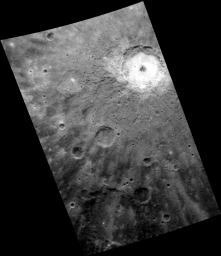The image above shows the complex crater Debussy, known for its bright rays that almost completely obscure the terrain surrounding the crater. The bright appearance of Debussy and its rays suggests that this crater is relatively young, as rays tend to fade over time. In addition to contributing to our understanding of relative ages, crater rays are also useful for understanding how cratering processes operate on Mercury.
This image was acquired as a high-resolution targeted observation. Targeted observations are images of a small area on Mercury's surface at resolutions much higher than the 200-meter/pixel morphology base map. It is not possible to cover all of Mercury's surface at this high resolution, but typically several areas of high scientific interest are imaged in this mode each week.
Date acquired: August 28, 2012
Image Mission Elapsed Time (MET): 254615176
Image ID: 2473506
Instrument: Narrow Angle Camera (NAC) of the Mercury Dual Imaging System (MDIS)
Center Latitude: -37.24°
Center Longitude: 11.27° E
Resolution: 269 meters/pixel
Scale: Debussy is approximately 80 km (50 mi.) in diameter.
Incidence Angle: 38.5°
Emission Angle: 50.7°
Phase Angle: 89.1°
The MESSENGER spacecraft is the first ever to orbit the planet Mercury, and the spacecraft's seven scientific instruments and radio science investigation are unraveling the history and evolution of the Solar System's innermost planet. Visit the Why Mercury? section of this website to learn more about the key science questions that the MESSENGER mission is addressing. During the one-year primary mission, MDIS acquired 88,746 images and extensive other data sets. MESSENGER is now in a year-long extended mission, during which plans call for the acquisition of more than 80,000 additional images to support MESSENGER's science goals.
These images are from MESSENGER, a NASA Discovery mission to conduct the first orbital study of the innermost planet, Mercury. For information regarding the use of images, see the MESSENGER image use policy.

 Planetary Data System
Planetary Data System












